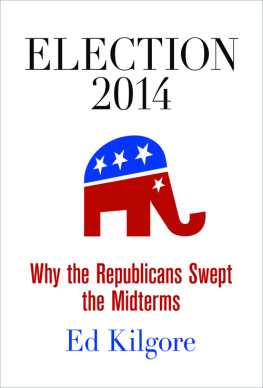Copyright 2015 University of Pennsylvania Press
All rights reserved. Except for brief quotations used for purposes of review or scholarly citation, none of this book may be reproduced in any form by any means without written permission from the publisher.
Published by
University of Pennsylvania Press
Philadelphia, Pennsylvania 191044112
www.upenn.edu/pennpress
A Cataloging-in-Publication record is available from the Library of Congress
Cover design by John Hubbard
ISBN 978-0-8122-4744-2 hardcover
ISBN 978-0-8122-9166-7 ebook
Campaign books are a strange genre of American nonfiction, heavily influenced by a few models from the relatively recent past. There is most obviously the Making of the President series by Theodore White, covering the presidential elections from 1960 through 1972. (A final volume discussed the 1980 elections in the context of a revised take on the previous quarter century.) These books were self-consciously official in tone and relied heavily on authorized reporting of the major contenders, with most of the analysis focused on the winning campaign (as the titles suggested). Then there is the deliberately iconoclastic countermodel of gonzo journalist Hunter S. Thompsons Fear and Loathing on the Campaign Trail 1972, which abandoned objectivity and every other rule of conventional political reporting in the pursuit of deeper truths about American politics and government and an impressionistic presentation of the frenetic pace and sheer hellishness of a national campaign. A number of insider-outsider hybrid books have since occasionally appeared, the best received of which was Richard Ben Cramers What It Takes, an account of the 1988 presidential campaign that owed a lot of its perspective to the fact that it was not published until 1992. The most recent exemplar in the field was probably Game Change, Mark Halperin and John Heilemanns book on the 2008 campaign that wrung a made-for-television movie out of its sensationalistic scoops and its focus on a single factor (the selection of Sarah Palin as John McCains running mate) in a complicated election.
You will note that none of these books was about a midterm election, probably because midterm elections (with the possible exception of the 1994 contest, with its semimythical Contract with America and Newt Gingrich as a protagonist) typically lack the dominant personalities and clean story lines of presidential cycles. No, midterms have been largely left to the political scientists to dissect, beyond the rearview-mirror accounts prepared as background to the next batch of presidential campaign histories. This book seeks to break that mold by treating a midterm election as a unique event worth understanding.
While not strictly speaking a work of political science, this book does aim at providing a clear understanding of the dynamics of the 2014 elections that transcends (while often drawing upon) the episodic reporting and analysis of political journalistsand without the benefit of later hindsight. My own hybrid experience as a news-cycle blogger for Washington Monthly (writing twelve posts a day), a weekly columnist for Talking Points Memo, and the managing editor of an online forum focused on political strategy placed me in a position to think and write critically about the media coverage that shaped perceptions of the midterms even as they were unfolding. In that spirit, this book challenges questionable elements of the conventional wisdom surrounding the 2014 elections before it completely congeals.
I believe the trajectory and outcome of the 2014 midterms were relatively predictable and almost entirely explainable by a set of fundamental factorsincluding the electoral landscape, midterm turnout patterns, the presidents approval ratings, sour perceptions of the economy and of politics, and some external news accidentsthat all favored Republican candidates. It was in the continuing interest of both political journalists and partisan operatives, however, to give these fundamentals at most lip service while crafting dramatic narratives that credited the players in the electoral game with a lot more control over events than was justified. This endowed the elections themselves with more significance in signaling the future direction of American politics than we have good reason to assume. On the margins, of course, all sorts of factors, including dubious media narratives, affect electoral outcomes, so they, too, are part of our story.
I have sought in these pages to suspend my own political and ideological allegiances and dispassionately analyze what happened and why, and I apologize for any failures in achieving that posture. This was not, on balance, a particularly entertaining election cycle, and the daily grind of watching myriad candidates from each party hammer away monotonously on the same handful of cookie-cutter themes was not always an edifying experience. I hope to spare readers the tedium of following this election cycle and instead pare it down to its essential features, results, and implications. Those are interesting enough without the embellishments of imaginative journalists and ambitious spinners.
We obviously do not know at this point how history will regard the 2014 elections. As was the case after the 2010 elections, Republicans hope they have achieved a breakthrough that makes the presidency of Barack Obama a Waterloo for liberalism. Democrats just as naturally view this election as a cyclical setback at odds with their partys long-term advantages; some blame the president for the 2014 results and look forward to a post-Obama era. In this era of the permanent campaign, we have already entered the 2016 campaign cycle. And each partys understandingand misunderstandingof what just happened may influence the next chapter of American political history.
The Fundamentals and the Narrative
The midterm elections of 2014 were probably the most widely examined and debated of their kind in American history, and not because they were necessarily historic or even remarkable. This cycle did, however, coincide with a sudden upsurge in interest in the science of election analysis, some coming from political scientists entering the mainstream conversation in increasing numbers and some from journalists applying statistical methods popularized in other fields, including sports. Add in a continuation of the recent growth in publicly available polling data and an atmosphere of partisan and ideological polarization that has inevitably intensified all arguments over politics, and you have a cycle exhibiting a constant contrast between a turned-off electorate exhibiting disdain for both parties and for politics and government generally and highly engaged activists and pundits battling over interpretation of every development.
Midterm elections are often interpreted as interludes and prefaces, providing context and sometimes contrast to the better-known and more momentous presidential contests. But some, typically landslides, are remembered as initiating eras and creating classes of subsequently ).
Second-term midtermsthose occurring in a second presidential termare especially notorious for signaling fatigue with the incumbent presidential party. Only once since the nineteenth century has the presidential party actually made gains in a second-term midterm ). In five of those seven cases (all but 1938 and 1986), poor midterm performance was a leading indicator of a presidential defeat in the ensuing cycle.






